Related Research Articles

Atonality in its broadest sense is music that lacks a tonal center, or key. Atonality, in this sense, usually describes compositions written from about the early 20th-century to the present day, where a hierarchy of harmonies focusing on a single, central triad is not used, and the notes of the chromatic scale function independently of one another. More narrowly, the term atonality describes music that does not conform to the system of tonal hierarchies that characterized European classical music between the seventeenth and nineteenth centuries. "The repertory of atonal music is characterized by the occurrence of pitches in novel combinations, as well as by the occurrence of familiar pitch combinations in unfamiliar environments".

Anton Webern was an Austrian composer and conductor. His music was among the most radical of its milieu in its concision and use of then novel atonal and twelve-tone techniques in an increasingly rigorous manner, somewhat after the Franco-Flemish School of his studies under Guido Adler. With his mentor Arnold Schoenberg and his colleague Alban Berg, Webern was at the core of those within the broader circle of the Second Viennese School. He was arguably the first and certainly the last of the three to write music in a style lauded for its aphoristic, expressionist potency, reflecting his instincts and the idiosyncrasy of his compositional process.
The Second Viennese School was the group of composers that comprised Arnold Schoenberg and his pupils, particularly Alban Berg and Anton Webern, and close associates in early 20th-century Vienna. Their music was initially characterized by late-Romantic expanded tonality and later, a totally chromatic expressionism without firm tonal centre, often referred to as atonality; and later still, Schoenberg's serial twelve-tone technique. Adorno said that the twelve-tone method, when it had evolved into maturity, was a "veritable message in a bottle", addressed to an unknown and uncertain future. Though this common development took place, it neither followed a common time-line nor a cooperative path. Likewise, it was not a direct result of Schoenberg's teaching—which, as his various published textbooks demonstrate, was highly traditional and conservative. Schoenberg's textbooks also reveal that the Second Viennese School spawned not from the development of his serial method, but rather from the influence of his creative example.
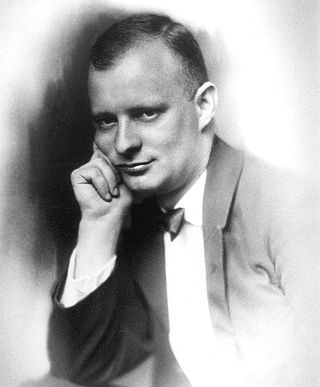
Paul Hindemith was a German and American composer, music theorist, teacher, violist and conductor. He founded the Amar Quartet in 1921, touring extensively in Europe. As a composer, he became a major advocate of the Neue Sachlichkeit style of music in the 1920s, with compositions such as Kammermusik, including works with viola and viola d'amore as solo instruments in a neo-Bachian spirit. Other notable compositions include his song cycle Das Marienleben (1923), Der Schwanendreher for viola and orchestra (1935), the opera Mathis der Maler (1938), the Symphonic Metamorphosis of Themes by Carl Maria von Weber (1943), and the oratorio When Lilacs Last in the Dooryard Bloom'd (1946), a requiem based on Walt Whitman's poem. Hindemith and his wife emigrated to Switzerland and the United States ahead of World War II, after worsening difficulties with the Nazi German regime. In his later years, he conducted and recorded much of his own music.
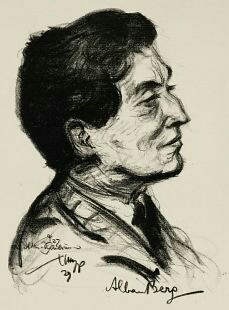
Alban Berg's Violin Concerto was written in 1935. It is probably Berg's best-known and most frequently performed piece. In it, Berg sought to reconcile diatonicism and dodecaphony. The work was commissioned by Louis Krasner, and dedicated by Berg to "the memory of an angel". It was the last work he completed. Krasner performed the solo part in the premiere at the Palau de la Música Catalana, Barcelona, in April 1936, four months after the composer's death.
The Violin Concerto by Arnold Schoenberg dates from Schoenberg's time in the United States, where he had moved in 1933 to escape Nazi Germany. The piece was written in 1936, the same year as the String Quartet No. 4. At the time of its completion, Schoenberg was living in Brentwood, Los Angeles, and had just accepted a teaching position at the University of California, Los Angeles. The work is dedicated to Anton Webern.
The Alban Berg Quartett was a string quartet founded in Vienna, Austria in 1970, named after Alban Berg.

Robert Gerhard i Ottenwaelder was a Spanish Catalan composer and musical scholar and writer, generally known outside Catalonia as Roberto Gerhard.
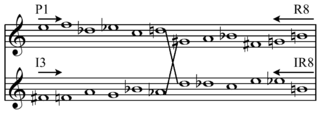
In music, a permutation (order) of a set is any ordering of the elements of that set. A specific arrangement of a set of discrete entities, or parameters, such as pitch, dynamics, or timbre. Different permutations may be related by transformation, through the application of zero or more operations, such as transposition, inversion, retrogradation, circular permutation, or multiplicative operations. These may produce reorderings of the members of the set, or may simply map the set onto itself.

The Lyric Suite is a six-movement work for string quartet written by Alban Berg between 1925 and 1926 using methods derived from Arnold Schoenberg's twelve-tone technique. Though publicly dedicated to Alexander von Zemlinsky, the work has been shown to possess a "secret dedication" and to outline a "secret programme".
Leopold Spinner was an Austrian-born, British-domiciled composer and editor.

Rudolph Ganz was a Swiss-born American pianist, conductor, composer, and music educator.

Jacques-Louis Monod was a French composer, pianist and conductor of 20th century and contemporary music, particularly in the advancement of the music of Charles Ives, Edgard Varèse, Arnold Schoenberg, Anton Webern and uptown music; and was active primarily in New York City and London during the second half of the twentieth century.

Dial Records was an American record company and label that specialized first in bebop jazz and then in contemporary classical music. It was founded in 1946 by Ross Russell. Notable artists who recorded for Dial include Charlie Parker, who signed an exclusive one-year recording contract with Russell on 26 February 1946, as well as Miles Davis, Max Roach, and Milt Jackson. Dial Records initially pressed its music for the Tempo Music Shop of Hollywood, California, but soon relocated to New York City.
The Gustav Mahler Conducting Competition is one of the most important music competitions of its kind worldwide and is held in Bamberg, Germany. Conductors no older than 35 years may enter.
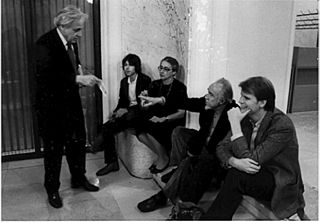
The International Society for Contemporary Music (ISCM) is a music organization that promotes contemporary classical music.
Werner Reinhart was a Swiss merchant, philanthropist, amateur clarinetist, and patron of composers and writers, particularly Igor Stravinsky and Rainer Maria Rilke. Reinhart knew and corresponded with many artists and musicians of the early-mid 20th century in Europe world, and his Villa Rychenberg in Winterthur became an international meeting point for musicians and writers.

Alban Berg composed his Three Pieces for Orchestra, Op. 6, between 1913 and 1915. They are dedicated to his teacher Arnold Schoenberg. A revised version of the score was published in 1929 by Universal Edition. The first performance of the first two pieces took place in Berlin in 1923, conducted by Anton Webern; the complete work was premiered in Oldenburg in 1930, conducted by Johannes Schüler.
Variations for piano, Op. 27, is a twelve-tone piece for piano composed by Anton Webern in 1936. It consists of three movements:
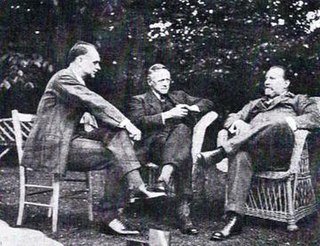
Thomas Edward Clark was an English conductor and music producer for the BBC. Through his positions in leading new music organizations and his wide-ranging contacts with British and European composers, he had a major impact on making contemporary classical music available to the British public for over 30 years. He was a leading figure in the BBC's Concerts of Contemporary Music between 1926 and 1939, and he played a significant role in the founding and early development of the BBC Symphony Orchestra. He held prominent positions in the International Society for Contemporary Music (ISCM) from its inception in 1922, and was its president from 1947 to 1952.
References
\